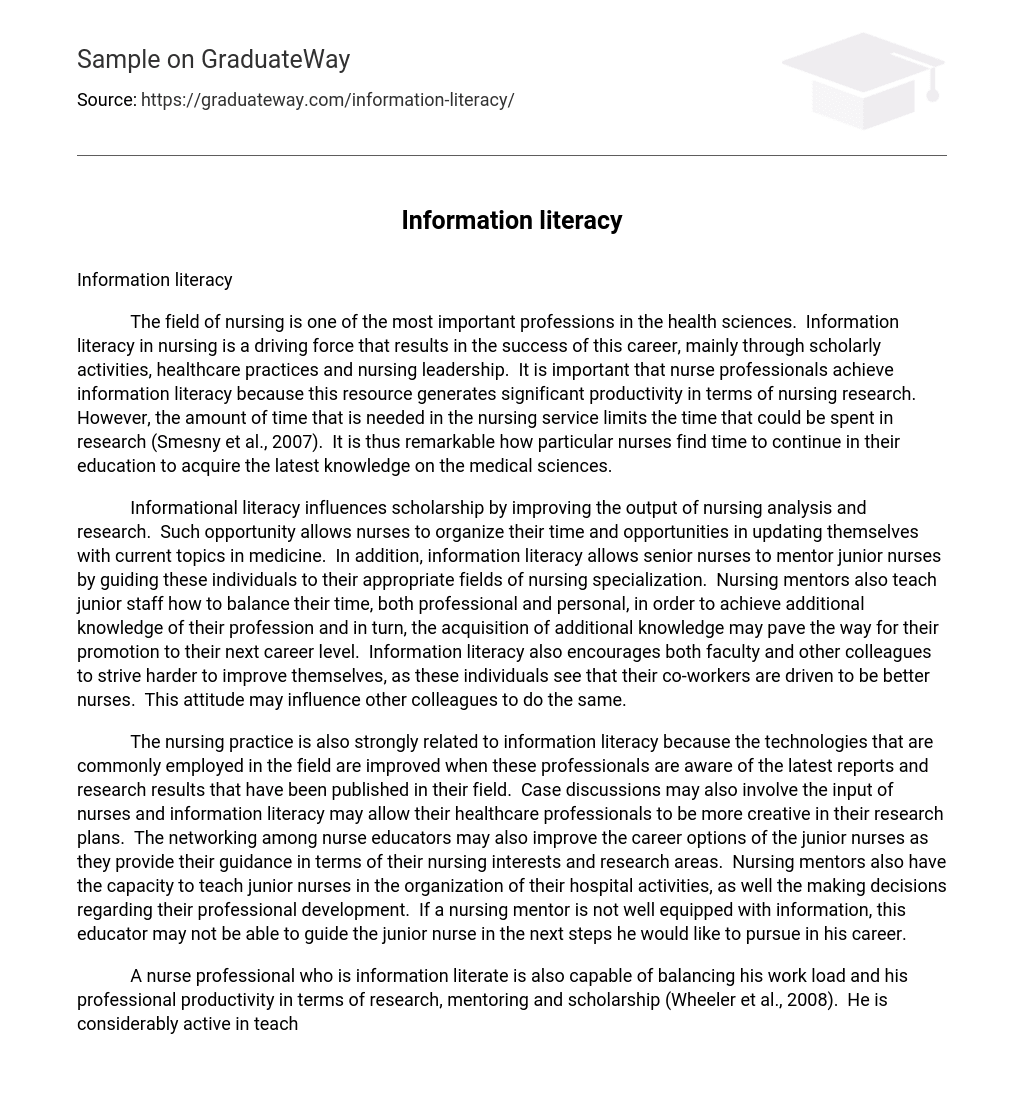The field of nursing is one of the most important professions in the health sciences. Information literacy in nursing is a driving force that results in the success of this career, mainly through scholarly activities, healthcare practices and nursing leadership. It is important that nurse professionals achieve information literacy because this resource generates significant productivity in terms of nursing research. However, the amount of time that is needed in the nursing service limits the time that could be spent in research (Smesny et al., 2007). It is thus remarkable how particular nurses find time to continue in their education to acquire the latest knowledge on the medical sciences.
Informational literacy influences scholarship by improving the output of nursing analysis and research. Such opportunity allows nurses to organize their time and opportunities in updating themselves with current topics in medicine. In addition, information literacy allows senior nurses to mentor junior nurses by guiding these individuals to their appropriate fields of nursing specialization. Nursing mentors also teach junior staff how to balance their time, both professional and personal, in order to achieve additional knowledge of their profession and in turn, the acquisition of additional knowledge may pave the way for their promotion to their next career level. Information literacy also encourages both faculty and other colleagues to strive harder to improve themselves, as these individuals see that their co-workers are driven to be better nurses. This attitude may influence other colleagues to do the same.
The nursing practice is also strongly related to information literacy because the technologies that are commonly employed in the field are improved when these professionals are aware of the latest reports and research results that have been published in their field. Case discussions may also involve the input of nurses and information literacy may allow their healthcare professionals to be more creative in their research plans. The networking among nurse educators may also improve the career options of the junior nurses as they provide their guidance in terms of their nursing interests and research areas. Nursing mentors also have the capacity to teach junior nurses in the organization of their hospital activities, as well the making decisions regarding their professional development. If a nursing mentor is not well equipped with information, this educator may not be able to guide the junior nurse in the next steps he would like to pursue in his career.
A nurse professional who is information literate is also capable of balancing his work load and his professional productivity in terms of research, mentoring and scholarship (Wheeler et al., 2008). He is considerably active in teaching junior hospital staff members in specific medical cases, as well as the most advanced medical technologies that are currently available for use. It should be understood that balancing time for professional and personal activities entails intricate planning hence a nurse professional who is capable of providing for both areas of his life must have a good understanding and control of his time and efforts. In terms of his professional life, a nurse professional who is information literate has learned that service and continuing education are key components of his field of specialization. It is thus more productive and satisfying to lead a life of a nurse that is both helpful in the clinics and at the same time continuing to improve his own self through time.
Information literacy thus plays an important role in the field of nursing because it fosters scholarship, mentorship, leadership and good medical practice. The ability to acquire resources associated with information literacy may thus definitely improve the performance of a nursing professional and this will both help the healthcare system, including patient care and medical services in the hospital. Information literacy also increases the self-esteem of a nursing professional because it provides extra leverage as to the quality of nursing care that may be provided to the patients.
References
Smesny, A.L., Williams, J.S., Brazeau, G.A., Weber, R.J., Matthews, H.W. and Das, S.K. (2007). Barriers to scholarship in dentistry, medicine, nursing, and pharmacy practice faculty. American Journal of Pharmaceutical Education, 71(5),1-9.
Wheeler, E.C., Hardie, T., Schell, K. and Plowfield, L. (2008). Undergraduate research mentoring and faculty scholarship in nursing. Nursing Outlook, 56(1),9–15.





